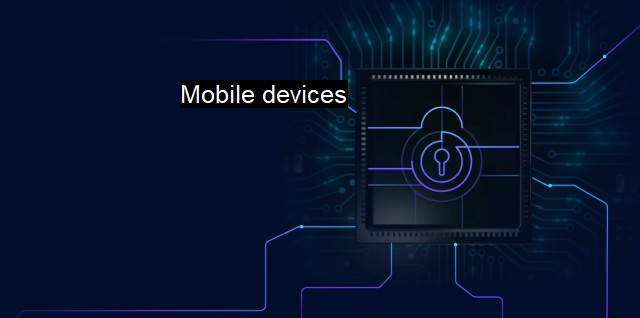What are Mobile devices?
The Importance of Understanding Mobile Devices in Cybersecurity and Antivirus: Protecting Personal and Professional Data Across Any Network.
Mobile devices refer to portable, handheld computing devices that have a touch or non-touch display interface and a miniaturized keyboard. They can easily connect to the internet and perform most functions traditionally reserved for desktop or laptop computers such as browsing the web, sending emails, and using various software applications. Examples of these devices range from smartphones, tablets, and smartwatches, to personal digital assistants (PDAs), handheld gaming consoles, and e-readers. Such technologies are feats of human engineering, conveniently compacted into tiny tools we ca carry in our pockets. they are often targeted in cybersecurity attacks, and they require protection just like any other computer would.Mobile devices represent a double-edged sword. On one hand, they have revolutionized how people live and work, enabling ubiquitous connectivity and unmatched convenience. On the other hand, they simultaneously present new security challenges, providing additional entry points for cyber threats.
Antivirus for mobile devices functions similarly like its computer counterpart. It is software designed to detect and fend off malicious applications or files. The antivirus program primarily scans the device for known threats. Should it discover any, it disposes them in a secure manner, and the device is returned to its previous state of compromised security.
Despite the prevalence of mobile devices, many people still do not fully understand the security risks associated with them. Mobile devices are just as vulnerable to malware, spyware, phishing, and ransomware attacks. Worse still, because smartphones and tablets are often used for both personal and professional tasks, they may contain a wealth of sensitive information, creating a potentially damaging situation should this data land in the wrong hands. Some mobile device users make it easy for hackers by not using password protection, using insecure networks, and downloading apps from unverified sources.
Several cybersecurity measures are currently in place to safeguard mobile devices against an array of threats. Two-factor authentication, password-protected devices, secure Wi-Fi use, and regularly updating apps and systems are common, mainstream security practices. Yet the most critical practice is arguably running mobile antivirus software, particularly on devices using operating systems with an open design such as Android.
Of notable mention is the constantly evolving nature of cybersecurity threats - while traditional viruses, worms, and trojans are still being used, increasingly sophisticated ways of exploiting mobile device users are appearing with advancing technology. These include zero-day attacks, malevolent apps camouflaged as legitimate programs, and advanced persistent threats (APTs). Mobile antivirus software is continuously being updated and improved to keep up with these emerging threats.
To further secure mobile devices, users need to be aware of cybersecurity best practices. These include updating the operating system and apps to fix security vulnerabilities, back up valuable data so it can be restored should a device fall prey to a ransomware attack, avoid using public Wi-Fi for sensitive operations such as online banking, only download apps from trusted sources to avoid malware, and use secure passwords, keeping them confidential.
Mobile devices, as sleek and compact as they may be, are susceptible to numerous cybersecurity threats. An antivirus stands as the frontline defense against these potential threats. To maintain their effectiveness in protecting our mobile devices, software must continually evolve to counter emerging cybersecurity threats. education on cybersecurity measures is necessary to enhance successful monument security.

Mobile devices FAQs
What is mobile device security?
Mobile device security refers to the protection of mobile devices (such as smartphones, tablets, and laptops) against cyber attacks, theft, unauthorized access, and data breaches. It involves implementing security measures and using antivirus software to safeguard sensitive information and prevent attackers from exploiting vulnerabilities.Why do mobile devices need antivirus protection?
Mobile devices are vulnerable to various types of malware, including viruses, ransomware, spyware, and phishing scams. These threats can compromise personal and sensitive data, steal login credentials, and cause financial losses. Antivirus protection helps to detect and remove malware and other malicious software, as well as prevent future attacks.What are the common mobile device security risks?
The common mobile device security risks include: - Malware attacks - Phishing scams - Lost or stolen devices - Weak passwords - Unsecured Wi-Fi networks - Outdated software - Malicious apps - Jailbroken or rooted devices - Social engineering tacticsHow can I improve the security of my mobile devices?
To improve the security of your mobile devices, you can take the following steps: - Use strong passwords and two-factor authentication - Install antivirus software and keep it up-to-date - Avoid downloading apps from unknown sources - Update your device's software and apps - Avoid using public Wi-Fi networks - Enable remote wipe and lock features - Backup your data regularly - Be vigilant against phishing scams and suspicious emails - Avoid jailbreaking or rooting your device - Use a VPN when accessing the internet| | A | | | B | | | C | | | D | | | E | | | F | | | G | | | H | | | I | | | J | | | K | | | L | | | M | |
| | N | | | O | | | P | | | Q | | | R | | | S | | | T | | | U | | | V | | | W | | | X | | | Y | | | Z | |
| | 1 | | | 2 | | | 3 | | | 4 | | | 7 | | | 8 | | |||||||